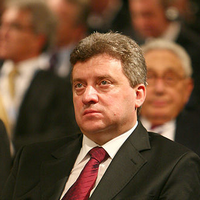SKOPJE, Macedonia -- When the old Yugoslavia tore itself apart during the 1990s, the people of Macedonia watched with dismay. Would they, too, experience the horror of war if they declared their independence from Belgrade? As it happened, Macedonia's secession from Yugoslavia triggered only a token action from the Yugoslavian army. That, however, did not mean that Macedonia would join the community of nations without conflict or strife.
Conflict did come, in the form of profound internal divisions that sparked a brief, low-grade war, and stubborn external obstacles that nearly blocked the way to international recognition.
Almost two decades into independence, Skopje still faces two major challenges in achieving its goals. From within, the threat of ethnic conflict between the Slavic majority and the large Albanian minority regularly flares up with enough intensity to make the population extremely nervous. Then, there's the seemingly trivial matter of the country's name. To outsiders, arguing over what to call a country may seem unimportant. To Greece, which has its own Macedonia region, the country's name suggests ominous territorial ambitions. The name is troubling enough that Athens has steadfastly blocked the young nation from achieving some of its most cherished goals unless it comes up with a name acceptable to its southern neighbor.

